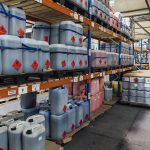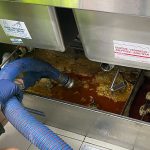How Grease Trap Maintenance Contributes to a Greener Food Service Industry
In today’s environmentally conscious world, businesses across all industries are expected to take steps toward sustainability. For the food service industry, where operations produce significant volumes of waste, implementing eco-friendly kitchen practices is more than a responsibility, it’s an operational necessity. Among the systems that contribute to responsible waste disposal in the kitchen, grease trap maintenance plays an important role.
When properly maintained, these systems prevent plumbing issues while supporting broader environmental goals. In this article we look at how maintaining grease traps can help food service operators establish a more sustainable food service model.
Sustainable Food Service Begins with Effective Grease Management
At the core of any sustainable food service operation is the ability to handle waste efficiently, and grease traps are a part of this. Grease traps capture fats, oils, and grease (FOG) before these substances reach the wastewater system. If not maintained, these substances can clog pipes, pollute water systems, and contribute to the degradation of public infrastructure.
By ensuring that grease traps are cleaned and inspected regularly, businesses can prevent harmful discharges into the environment. This simple yet effective act aligns directly with sustainable food service goals. It reduces the strain on council treatment facilities and lessens the likelihood of emergency plumbing repairs. Proper maintenance, therefore, supports a cleaner, more efficient waste system that benefits both the business and the broader community.
Eco-Friendly Kitchen Practices Include Grease Trap Care
Eco-friendly kitchen practices involve operational habits that protect local ecosystems. As a part of this, routine grease trap maintenance is a undertaking that plays an important role.
When FOG waste is allowed to accumulate in a poorly maintained trap, it can overflow into sewer lines and eventually reach waterways. This can lead to environmental contamination and harm aquatic life. Conversely, food service businesses that integrate grease trap maintenance into their kitchen practices help prevent these outcomes. They contribute to a cleaner water cycle and minimise the environmental risks associated with daily food production activities.
Employing professionals to handle grease trap cleaning ensures that the FOG waste is collected and disposed of in a way that complies with environmental regulations. Clarence Valley Septics not only removes the waste but also ensures it is treated and disposed of appropriately.
Responsible Waste Disposal Through Grease Trap Maintenance
Responsible waste disposal is a fundamental part of any business operation, and while solid waste often takes the spotlight, liquid waste, including FOG, deserves equal attention.
The routine servicing of grease traps guarantees that the waste is being managed correctly at the source. This ensures compliance with local regulations and demonstrates a commitment to environmental responsibility. In the long run, businesses benefit from fewer disruptions, lower maintenance costs, and a reputation for responsible waste disposal.
Clarence Valley Septics provides reliable and compliant grease trap services that ensure all collected waste is processed responsibly. This not only protects the environment but also helps businesses meet their legal obligations and maintain a positive reputation.
Reducing Environmental Impact One Trap at a Time
For food service businesses aiming to reduce their environmental impact, regular grease trap maintenance offers a straightforward and effective strategy. It minimises the risk of sewer overflows, reduces the burden on wastewater treatment plants, and limits the chances of environmental pollution.
Each maintained trap represents a step toward reducing environmental impact on a daily basis. For example, when a commercial kitchen ensures its grease trap is functioning correctly, it contributes to a larger system of environmental protection. It’s akin to a chain reaction: clean traps prevent grease from contaminating water, which in turn reduces the need for chemical interventions at treatment facilities.
This is important in Australia, where water conservation and environmental protection are national priorities. Businesses that actively contribute to these efforts through small but meaningful actions like grease trap care show leadership and environmental thought.
Green Business Initiatives That Start in the Kitchen
For many food service businesses, launching green initiatives can seem complex or costly. However, the kitchen is often the best place to start. Proper grease trap maintenance is one such initiative that brings immediate environmental benefits without requiring major changes to infrastructure or daily operations.
By investing in professional maintenance services, businesses align themselves with broader green initiatives and sustainability standards. It also opens opportunities for certifications or recognition from environmental organisations, enhancing the business’s appeal to eco-conscious consumers.
Clarence Valley Septics supports these efforts by providing services that integrate seamlessly with existing operations. Our expertise ensures that businesses meet both regulatory requirements and environmental objectives with minimal disruption.
How Properly Maintained Grease Traps Contribute to a Greener Food Service Industry
Maintaining grease traps might not be the most glamorous aspect of running a food service business, but it is impactful when it comes to sustainability. From protecting waterways to reducing waste treatment, a well-maintained grease trap supports many facets of a greener and cleaner operation. It contributes to sustainable food service, supports eco-friendly practices, ensures responsible waste disposal, reduces environmental impact, and promotes green business initiatives.
If your business is ready to take the next step towards environmental responsibility, Clarence Valley Septics can help. We provide professional grease trap maintenance that supports your sustainability goals. Contact us today to find out more.


